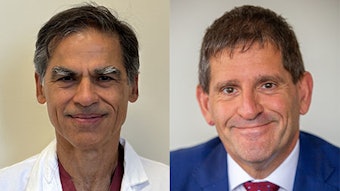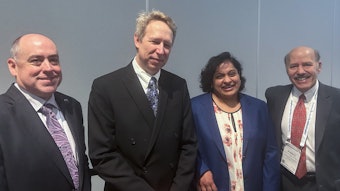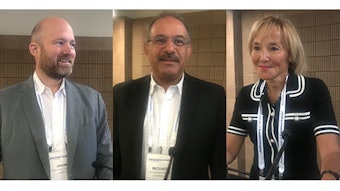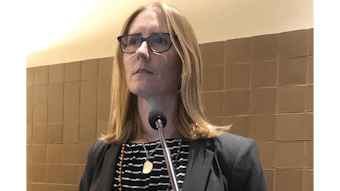Anesthesiologists taking the lead
Health care leaders bridge the gap between anesthesiology, policy, and patient care.
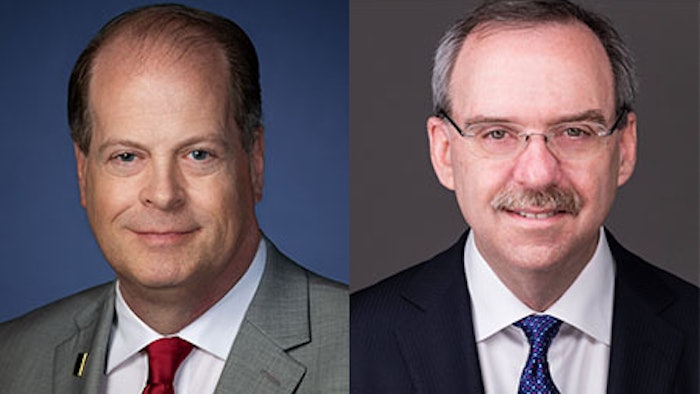
The journey to leadership can take many paths. For anesthesiologists, it’s likely to begin in the OR. From there, it can progress in a number of directions that profoundly impact not only the specialty, but health policy and organized medicine as a whole.
During 2024’s session, “Leadership in Medicine: Perspectives on Impact From Policy Leaders in High-Profile Organizations,” three distinguished ASA member anesthesiologists offered their insights on transitioning from the OR to influential leadership positions, leveraging their skills for impactful leadership, and addressing critical issues in patient care and public health. In addition to session moderator ASA President Ronald Harter, MD, FASA, the panel included Lee Fleisher, MD, Professor Emeritus and Chairman of Anesthesiology and Critical Care at the University of Pennsylvania Perelman School of Medicine, Jesse Ehrenfeld, MD, MPH, Professor and Senior Associate Dean at the Medical College of Wisconsin, and Valerie Arkoosh, MD, MPH, Secretary of the Pennsylvania Department of Human Services.
Dr. Harter, who is Professor of Anesthesiology at The Ohio State University Wexner Medical Center in Columbus, led the session. Reflecting on his journey, Dr. Harter said ASA helped shape him for leadership.
"Personally, I credit ASA a lot for my journey to leadership. I was elected to serve on ASA's Resident Component Governing Council during my residency, which provided me with insights very early in my career into the issues facing our specialty," he said. His involvement in various ASA committees and leadership roles in his department further honed his skills.
"My leadership roles in my department were synergistic with my ASA leadership roles – each role better prepared me for leadership in the other."
Dr. Fleisher, who formerly served as Chief Medical Officer and Director of the CMS’s Center for Clinical Standards and Quality, recounts his leadership progression from OR Coordinator at Johns Hopkins Hospital in Baltimore to Director of the OR and, eventually, his current university position. His expertise in infection control and critical care was crucial during his tenure in Washington, D.C., where he coordinated with the Centers for Disease Control and Prevention (CDC), Occupational Safety and Health Administration (OSHA), and the White House on infection control practices.
“When I was offered the position at CMS … during the pandemic, understanding clinical care and infection control in hospitals helped me coordinate … the best infection control practices in CMS-certified facilities,” he said.
Translating skills from the OR to leadership
Skills developed in the OR are highly transferable to leadership positions. Dr. Harter pointed to the ability to "rapidly assess a complex system and prioritize the issues of greatest urgency." Collaborating with physicians from various specialties also provides valuable insights into their perceptions and assumptions, which allows for more effective communication across disciplines, he said.
Dr. Fleisher echoed this sentiment and added that managing complex problems and pivoting quickly are crucial skills that can be honed in the OR.
Addressing the issues
Financial pressures are a significant concern impacting patient care, Dr. Harter said.
"The financial pressures that are accumulating create an ever-increasing shortfall in what we are paid relative to the cost of providing anesthesia care," he said. "This issue affects all anesthesiologists, regardless of their practice setting."
Dr. Fleisher highlighted the role of anesthesiologists in driving quality care and addressing social determinants of health, underscoring the importance of shifting the focus from payment issues to patient outcomes.
"When I took over leadership of the Perioperative Brain Health Initiative, it was in part to focus our discussion on patient outcomes writ large and not on payment or provider turf issues," he said.
Advocacy and representation
Effective advocacy requires personal involvement, according to Dr. Harter.
"Simply writing a check to the appropriate campaign and/or political action committee is a part of it, but it's not the most important aspect. Developing a relationship with your state and federal legislators is essential," he said. He emphasized that legislators need to hear directly from physicians to understand the essential role of anesthesiologists in health care.
Advice for aspiring leaders
For anesthesiologists aspiring to take on leadership roles, Dr. Harter advises not to be intimidated. "The reality is that there is plenty of work to be done at the local, state, and national levels," he said. Building a foundation of local and state involvement is essential for effective national service.
Dr. Fleisher encourages keeping the patient at the center of your message. "You will always win with that perspective."


